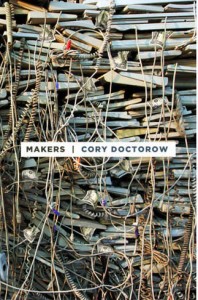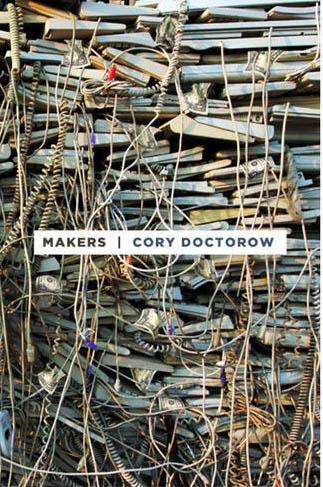Haris Durrani ’11
Opinions Editor

A lot of science fiction writers—or a lot of readers—seem to think the S.F. genre is aimed to predict the future.
This might be true to some extent, but to blogger, columnist, copyright activist, and writer Cory Doctorow, S.F. is more about influencing the future—making it—rather than playing weatherman.
His latest book, after all, is titled “Makers.”
It’s the tale of two maverick engineers, Perry Gibbons and Lester Banks, and the hard-hitting journalist, Suzanne Church, who decides to cover their story—all set in the backdrop of an almost Third World America.
More than anything else, it’s a novel of change—social, economic, psychological.
Perry and Lester change into socially-conscious entrepreneurs after beginning their journey building incredible devices from the junk in the abandoned mall where they live. Suzanne starts as a traditional print journalist and ends reporting as a world-renowned blogger.
As one character declares, “We don’t care about what you did yesterday—we care about what you’re going to do tomorrow.”
Doctorow’s science fiction carries readers from the present into the nearest possible future. Each of his societal and ideological changes only illuminates the dynamics of modern society.
A S.F. work by Doctorow can feel so much like it is set in the present that readers might not even think of the piece as science fiction. His novels and short stories are rarely strange fantasies of far-fetched futures, as is the usual “Star Wars” stereotype of science fiction, but are ground in the reality of the present.
“Makers” is no different.
Perry and Lester’s innovation is meant to depict the creative energy of Silicon Valley. Suzanne’s movement into the “blogosphere” echoes existing debate among journalists over web and print journalism. The “fatkins” treatment, which turns obesity into perfect physical health (it’s allegedly harmless), becomes a frenetic national trend—mirroring the dietary compulsiveness that currently bombards society and media.
Doctorow has something to say, and he’s going to say it loudly. He wants readers thinking, rethinking, and thinking again.
Good science fiction isn’t always about the science, but about the societal and philosophical effects of science. Doctorow does not fail in living up to this ideal.
Rather than portraying engineering as rote, Doctorow depicts the profession as an artistic undertaking that emerges from intuition and creative flare.
Perry and Lester’s products aren’t products to them. They regard each of their inventions as no less a work of art than a novel or painting.
As Lester explains to Suzanne, most engineering is “all about constraint,” limited by parts, time, mass, volume, computer memory. But Lester and Perry’s type of innovation is just the opposite: bound only by the plethora of items available to them in their junkyard ghost mall, the two are in possession of “the engineer’s most dangerous luxury: plenty.”
Once the “New Work” industry of creative engineering crashes, Perry and Lester build amusement rides commemorating the innovation of that brief era by carrying riders through nostalgic displays of the products of its time period.
But Perry finds himself sulking at a ride’s ticket booth, working a cash register all day long.
“You’re restless, Perry,” Lester tells him. “You’re just bored. You’re a maker, and you’re running things instead of making things.”
Doctorow points to the passion in engineering, and he continues to encourage themes of positive change as his two protagonists develop a similar drive for applying their machines to socially conscious business models. He stresses the importance of a business’ ability to empower customers rather than take advantage of them.
In a novel rich with heavy statements on some of the intricacies of modern society, readers might find a strong literary voice worth listening to.
But Doctorow does not allow his serious subject manner to pass without the characteristic quirkiness he melds into many of his literary works.
His language, for example, fits well with the protagonists’ geeky personalities. Even Doctorow’s metaphors resonate with the characters:
A crowd of friends listening to Lester’s retelling of his experience with the new fatkins treatment are “as spellbound as a roomful of Ewoks listening to C-3PO.” Disney launches a devastating lawsuit against Perry and Lester’s amusement rides “like Godzilla going after Tokyo.”
However, as Doctorow returns to adult fiction with “Makers,” he seems to have regained his solid prose but lost some of his literary fervor. While the writing in Doctorow’s previous novel, the New York Times-bestselling young adult S.F. book “Little Brother,” sometimes faltered, its passion made the novel a better one.
The ideas in “Makers” are inspiring; unfortunately, it isn’t until the Epilogue—after Doctorow has developed a strong cast of characters and plot—that he truly delivers an emotional punch in the form of heartfelt nostalgia.
Nevertheless, that the reader can look back on the rest of the novel with such wistfulness—that there is something of genuine substance to look back on at all—is at least a testament to Doctorow’s ability to produce a memorable story.













































